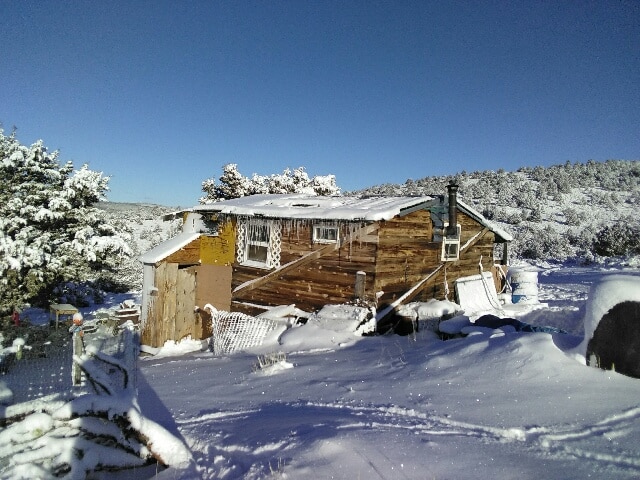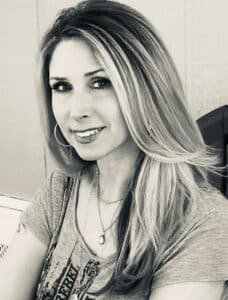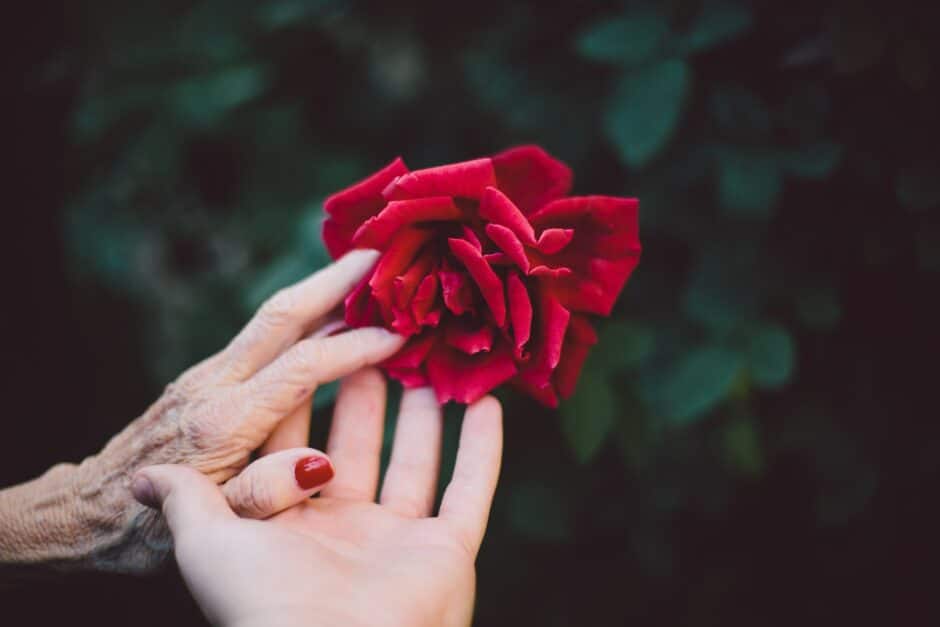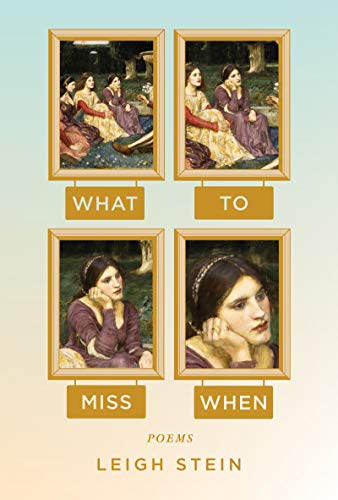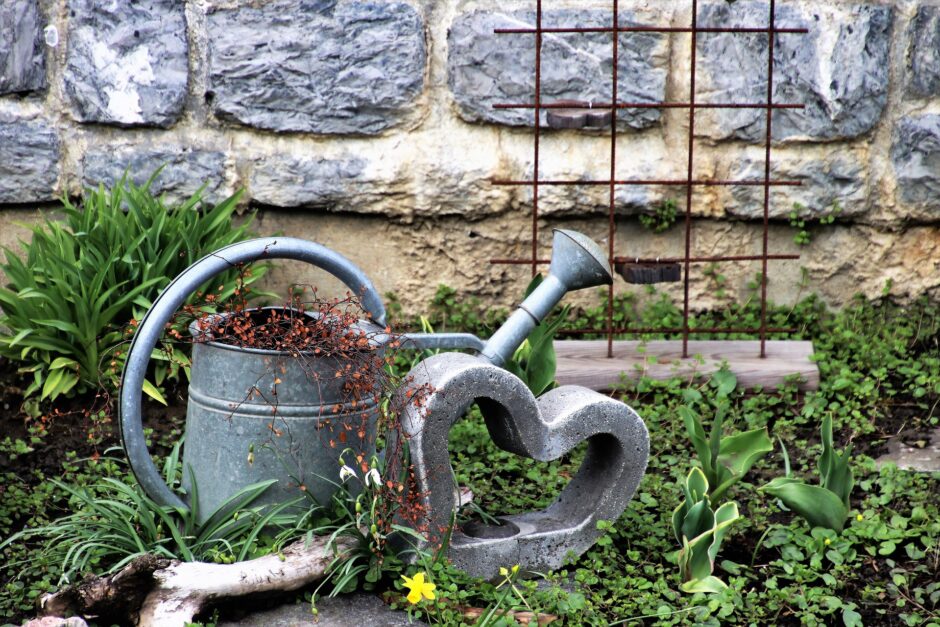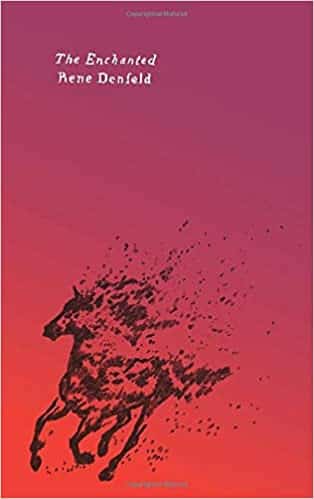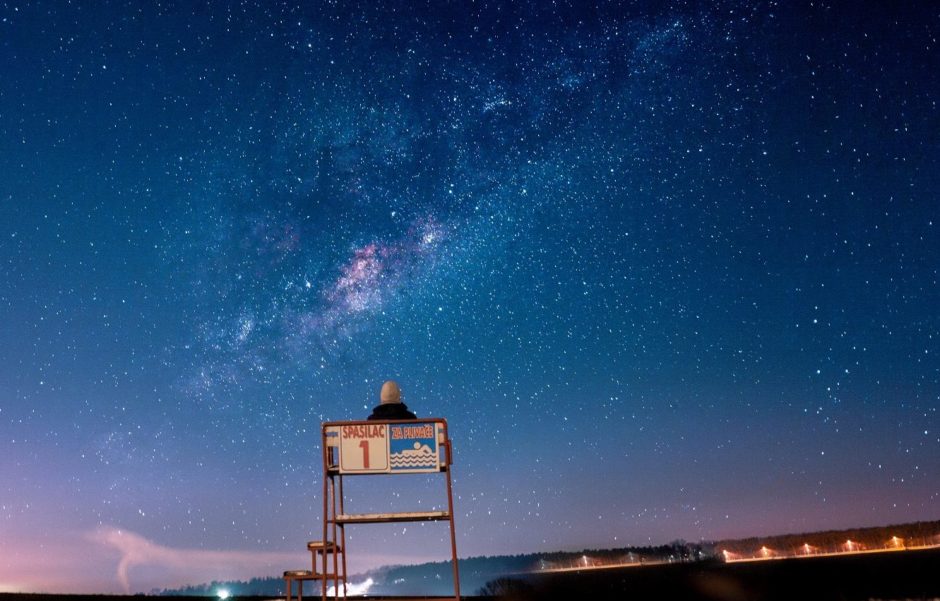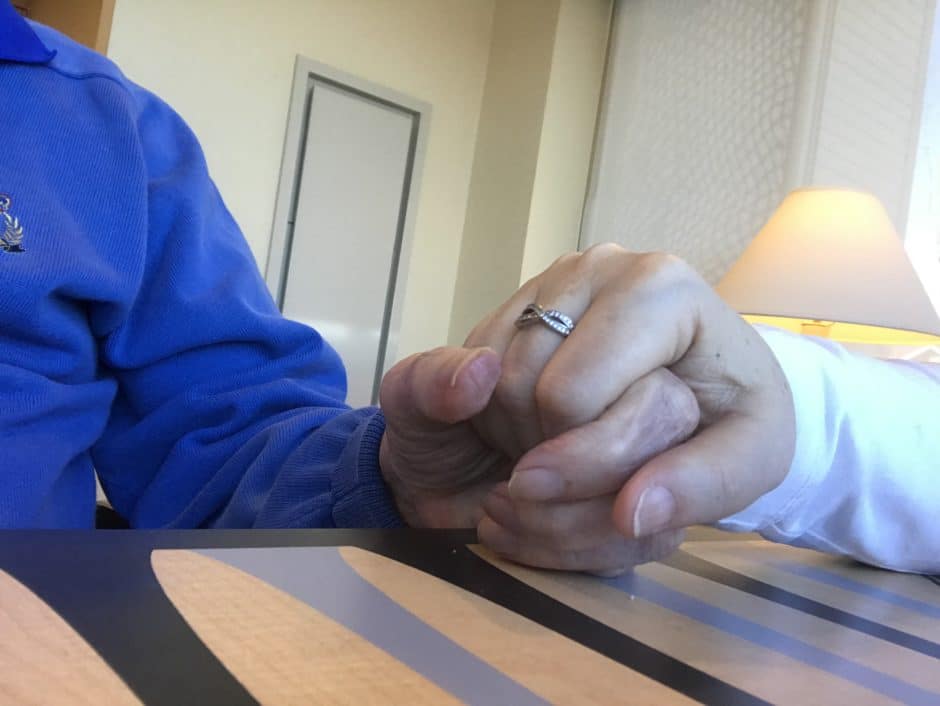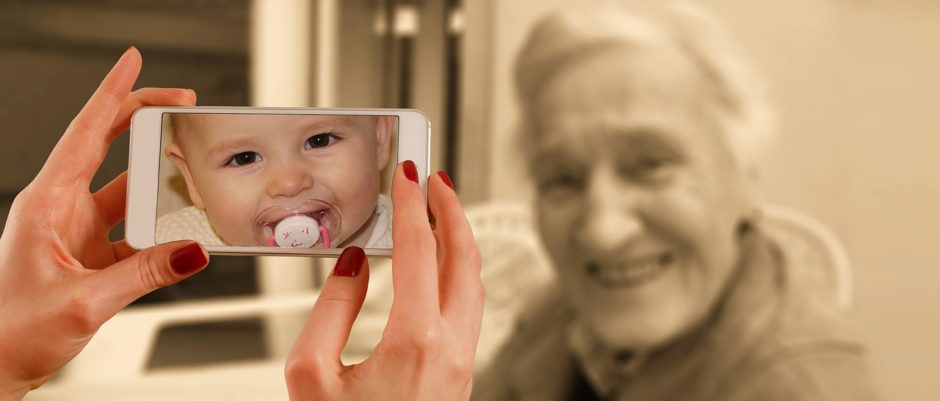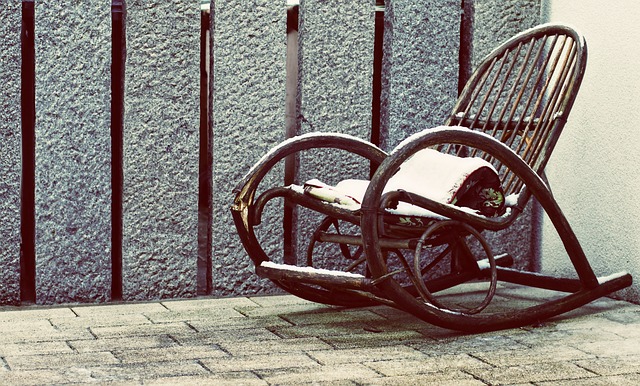The cake, with its creamy swirls of orange and yellow, is weirdly magnificent—a sunset in a pan. Banana caramel upside-down cake. I want it, but the list of ingredients and onerous instructions kill my appetite. I text the picture to my kitchen-whiz friend, Yvette.
She replies: “Wow. Are you going to make it?”
“Yes, someday.” And then I add: “Before I die.”
She sends back laugh-crying emojis because she knows me. I love salads-in-a-bag, jars of minced garlic, one-pot frozen meals from Trader Joe’s. Why rinse and chop, dice and blend (and then do all the clean-up) when you can catch up on grading, or putter in the garden, or better yet, sit on the porch with your cat?
I also send the picture to my mother, which I regret at once, because she wants the recipe, and though she would have made a wonderful cake, a sweet sunset like no other, there is no way she can.
And my heart hurts again as I face the chasm between what could be, and what is.
***
When she and my stepdad Mark decided to live off the grid eight years ago, they were in their early 70s, and a working kitchen was one of the loves my mother gave up. They’d used their last $10,000 to buy the tiny one-room cabin on 20 isolated acres, the sloping land so matted with juniper and bitter brush you have to shove your way through. They haul up water in 200-gallon containers and hike up a hill to the outhouse; keep their perishables in a Coleman cooler. It’s like dry camping year-round. Their mountain cabin is so hard to get to that if they were gravely injured, they’d have to be rescued by helicopter.
Yet she still pulls off savory bread in the Dutch oven, and makes pioneer-style cakes on the wood stove. Sometimes she sends me pictures if there’s a good enough cell signal.
***
“It’s like going on a cruise,” my mother says every time she visits my son and me in Reno. From her door to mine, it’s only 135 miles, but it takes her half a day. Their 3-mile road, originally a deer trail, is so steep and narrow and winding, so rocky and rutted that only a 4-W drive truck can manage—and then only at 2 mph. So they get up early and throw in Hefty bags of garbage and laundry in the truck, along with Mom’s duffel and the dogs, and trundle down the mountain.
In the valley, “the flats” they call it, a rancher lets them keep their ‘90 Suzuki Swift on his property. It sits there like a faded blue go-cart in the weeds, attracting mice to its innards, which they scare off with a few thumps on the hood.
After they transfer her bags to the car, Mom waves goodbye to my Mark and the border collies, Jasmine and Teddy, whips on her wraparound sunglasses, and takes off along the two-lane highways that cross the high desert basin of northeast California and into Nevada. Sometimes a highway patrol officer pulls her over for going so far under the speed limit—but at 79, her eyesight is bad and her hearing worse, and what’s the rush anyway. Three hours after leaving the flats, after a stop in Doyle to pee and eat an ice cream bar, she’ll pull into my driveway.
***
Before she comes I clean the house in a flurry. I have no answer to why—she doesn’t notice or care if the place is cluttered or clean, dusty or wiped and gleaming. To her, it’s glorious enough to walk from room to room. To sit at a dining room table or on a couch; to use sinks with running water, a flush toilet. Still, I fluff the pillows on her single bed in the little guest room, lay out new fleece socks for her feet that are always cold. I cut flowers in the summer, buy them in winter. Put a box of Junior Mints on the nightstand because her sweet tooth is legendary.
The two main things I offer that are the most magical in her mind (and you’d think I’d hired a limousine to escort us to the Atlantis spa): ice cream and a hot bath. So I always buy a gallon of salted caramel ice cream and an extra jar of caramel topping. She’ll finish both off in three days.
The bath is less grand, but she doesn’t agree. I live in a small manufactured home, with a crappy, cramped bathtub with plastic walls that bow inward if you lean against them. But on the mountain my parents use an outdoor shower—a solar-heated canvas bag of five lukewarm gallons. In the winter, they wash by the wood stove with vinegar and a basin of melted snow. When she comes here her hands are stained with dirt and wood ash.
At night, during her visits, I light a candle, and set out tropical bubble bath from Whole Foods. She soaks in the tub for up to an hour, reading a book or, I imagine, feeling her bones relax. Now and then I’ll hear the hot water blast as she freshens the temperature, and who can blame her for wanting to make it last?
***
It wasn’t until she met and married Mark, a taciturn, misanthropic man who loves the remote outdoors, 30 years ago, that the idea of this kind of living began for her. Although she’d taught my brother and me to revere nature, we grew up in neighborhoods and apartment complexes, and our times in the “wild” were spent in campgrounds with vending machines and hot pay showers. We never lived on a road that wasn’t paved.
With Mark, my mother moved from a house in a small town, to a farmhouse on 23 acres, to a trailer alongside the Gila National Forest in New Mexico, to the faraway cabin they have now. Each dwelling more rustic, more remote, than the last.
Early on, my mother was worried and went to see a therapist, who suspected their marriage was suffering from “folie a deux,” madness of two. She warned, One day one of you will die from this.***
I mail them care packages between Mom’s visits. Because for them the post office is a 40-mile, 3 hour round trip, I try to make it count, with fun and useful variety. I do what I can afford, and it’s never enough:
Just-Add-Water mixes: pancake, soup, mashed potatoes, tea and coffee
Hand and foot warmers
Waterproof gloves
Hats with LED lights built in
Books
Chocolate, no nuts that can break a tooth
Coconut oil for chapped skin
***
My stepdad doesn’t like comfort and convenience; they are signs of weakness, of capitulation to the bullshit status-quo. (When I got her a pedicure, he rolled his eyes.) But he loves her cakes, even when they’re dense from the 6,800’ elevation, or burnt on the edges. He calls my mother a trooper, which she enjoys. She likes being the only woman who could even begin to live up there.
Their clothes, mostly from the thrift store, take a beating from the rough mountain life, and when they go to town, they look like homeless people, or refugees who have walked across the land for a very long time, in all kinds of weather. As my mother says, it’s futile to try and keep clean on the mountain, what with all the dirt and dust, plus their two big dogs, and water so precious. “It’s just dirt, it won’t kill you,” she’s fond of reminding me. (This from Portland, Oregon’s 1964 Rose Festival Princess.)
One time, a woman walked up to them in the parking lot of Grocery Outlet and handed them a loaf of bread and a $5 dollar bill.
“So funny!” my mother texted, but I tried to picture the scene without crying.
***
When she comes here, I do all the cooking. On her first visits, years ago, I thought she’d jump in with glee to make her favorite recipes with every power kitchen tool I had: soufflés and mousses, Boston cream pies and buttery Dutch babies with a golden surface that bubbles and rises like the surface of the moon.
Yet she only hovers nearby, loving to watch—and, I realize, to rest. At the cabin, she does everything related to food—the grocery list and shopping, the cooking, the cleaning up that is a daunting chore when you have no plumbing. Burying scraps down the trail so as not to tempt mountain lions or other creatures.
For the first night, I buy appetizers, her favorites that are hard to keep on the mountain: egg salad, Greek yogurt, seafood salad in creamy white sauce, which she eats by the forkful straight from the tub, eyes raised to the ceiling in what can only be called ecstasy.
Theirs is a life of such physical work that even the thought of my mother’s day makes me want to go to bed and collapse into a long, warm nap.
***
I try not to show it, but her visits take a toll. After the third night, I get antsy at the work that’s piled up, and my 14-year old son retreats more into his bedroom for the solitude he’s used to. He likes having his bathroom to himself.
I’ll be quiet as a mouse, Mom tells us before a visit, which is impossible, and anyway, my kid and I are introverts, and she’s an extrovert. A flaming extrovert, she once admitted. And that is another love she’s given up to live on the mountain with a man who prefers silence and space. Each morning, if the reception is good, he’ll read fringe blogs on his phone about the New World Order, the dark dangers of the vaccine, chem trails, and other concerns.
Mom told me that she sometimes just talks to herself, which Mark doesn’t seem to notice. “I’ll say, ‘How’d you sleep, Carol?’ And then I answer myself: ‘Well I had to get up six times to squat and pee in the chamber pot, so it was pretty awful! What do you think about that!?’”
Knowing this, I just have to buck up (as my mother would say), but it’s not easy to throw out the routine that anchors my day: I get up at dawn, make coffee, throw out bird seed, and then feed the cats after giving Tiger Bomb his thyroid tablet in a salmon-flavored “pill pocket.” And then, with my son still blessedly asleep, I can return to my room to work. Sometimes, when there’s a lull in the semester, I get a chance to write. When those precious mornings come, the time feels carved out of my life like a vein of gold.
When Mom’s here, she tries. She tiptoes and peers in my door, which I leave open for the cats to go in and out.
“Oh! You’re up!”
That’s my cue to click off whatever I’m doing and tell her, Yes it’s fine, come in and sit here beside me and I’ll get you some coffee. She settles into the teal velvet chair next to the bed, wrapped in my robe. When I return and see her sitting there, like a grateful gnome who’s crept in from the cold wilderness, the pang returns to my chest and I think, to hell with the Forum posts. We sit and sip and chat about the day and I tell her funny stories about my classes. “This student’s title is ‘The Farters of the Enlightenment,’” I say, and she whoops. Haha! I tell her about the girl who wants to be a “pillow in the community,” which we agree is both funny, and sort of wonderful.
“Quiche or French toast,” I ask.
Her eyebrows raise. “French toast? With fruit?”
“How about sautéed strawberries? And powdered sugar.”
She sighs and says, “It’s like I’ve died and gone to heaven.”
***
By the second day I’ve usually blown off my work entirely, and have sent an announcement to my students to text me if there’s something urgent.
“How about we go to World Market today?”
“Could we?” Mom chirps, as if I’d offered to fly us to San Francisco for steamed clams and French bread. I feel a burst of anger because whatever I do or buy is so small, so fleeting, it doesn’t deserve such gratitude. What she needs is not gourmet groceries but a new car, a new wardrobe, hearing aids, solar panels for the cabin and a snowplow and a greenhouse that can withstand the winter storms. The list of what she needs is so long my pen will run dry before I’m done.
Instead we go to World Market and buy Sicilian pesto and German egg spaetzle, and Walnut Scottish shortbread for dessert. She lingers over lingonberry conserves and I say, toss it in. Then I add a jar of Devon cream and butterscotch root beer to drink while she discovers a few more things to try. In line, she says to the woman behind us, “Isn’t this place a kick? What a feast we’ll have tonight!”
On the way home, she inspects the items again one by one, as if these were gifts sent from around the world, just for her.
Each time she comes, she resembles a bit more the trees on the mountain, the dark, gnarled branches of the mahogany, the juniper and Manzanita; even the bitter brush that crouches and grips the earth through the harsh summer winds and the deep snowstorms of winter. She’ll be 80 next spring.
“Can’t you keep her,” a friend asked, after seeing a picture of us on Facebook during one visit. As if my mother were a stray dog who’d wandered in from the desert. It’s her choice to live this way. I tell myself this, again and again. She always tells me what she loves on the mountain—the birds who make their home in the cabin’s eaves, the view clear to Mt. Shasta hundreds of miles to the west. I see that her visits are a way of replenishing herself, and if this is all I can do, then for now, that will have to be enough. Beyond that, the future is a path that curves out of sight and into the dark.
By the fourth day we’ve done their laundry at Mr. Bubbles (with extra wash/extra rinse because the clothes are stiff with dirt and grime), which we fold and stuff back in the Hefty bags, and nestle them in her car. This process takes at least four hours. On top of the laundry we layer boxes of food and supplies from Wal-Mart. We find a space for the used books she’s picked out from Grassroots Books.
The night before, I’d heard her on the phone with Mark for their evening call, telling him about our day, and as always she asked about the sparrow family and the dogs, wanting to know if they missed her. She described all the things she’d be bringing home.
“You won’t believe your eyes,” she told him.
Then it’s time for her to go and my son carries out her duffel bag and we all stand in the driveway. She puts on her cowboy hat and the giant sunglasses and gives us both hugs, and I try not to feel the way her bones push through her coat.
“It’s not goodbye, it’s so long,” she says. Then she backs the car out slow as a tractor into the street, and before heading forward, waves out the window to us and yells, “Tra la!”
***
The other day, she texted she wouldn’t be able to visit any time soon. The Suzuki had broken down, needed to be towed away. It would cost a lot and they’d have to save up.
“When I do visit again,” she wrote, “can we make that cake, the banana caramel one? The one that looks like a sunrise.”
“Sunset,” I started to write, and then stopped because we try to have hope where we can.
Joelle Fraser, is the author of two memoirs (The Territory of Men and The Forest House). A MacDowell Fellow, her work has been published in many journals, including The Iowa Review, Fourth Genre, Pangyrus, Crazyhorse, and Michigan Quarterly Review.
She lives in Reno, Nevada with her 15-year old son and three rescue cats and is researching her next book, NO ONE CAN FIND YOU. Her website is www.joellefraser.com.
***
Writing Cohort Opportunity
Circe is offering: Crucible – A Year-Long Writing Cohort
Let by Gina Frangello and Emily Black, this cohort is designed for writers seeking to spend a year deeply immersed in writing or revising a book length work.
Email info@circeconsulting.net for more information
***
Statement on Black Lives Matter and support for social change

